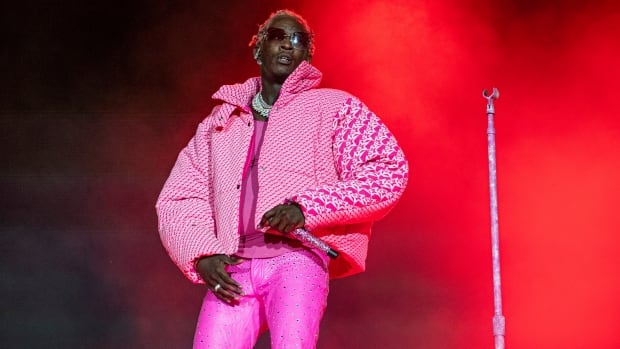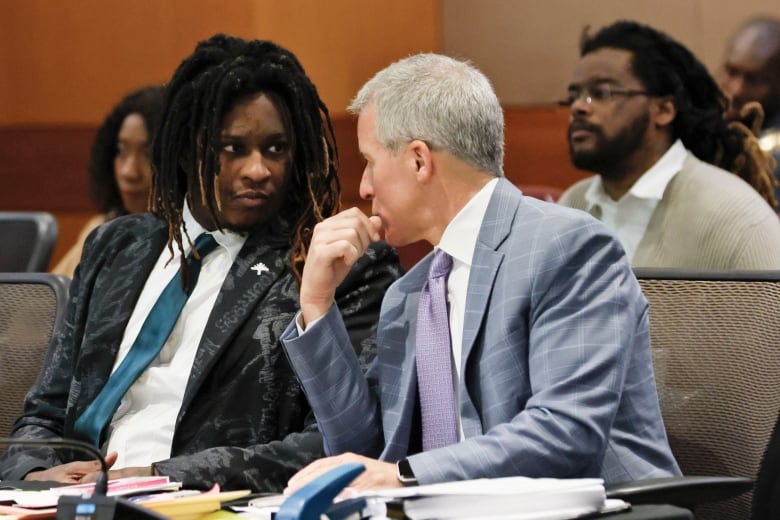
Rapper Young Thug is a free man after pleading guilty to gang, drug and gun charges.
About two and a half years after he was arrested on the charges in a sprawling gang and racketeering indictment, Young Thug was released from custody Thursday evening. It was a remarkable development in a trial that’s dragged on and been plagued by problems.
Jury selection at the Fulton County courthouse in Atlanta began in January 2023 and took nearly 10 months. Prosecutors had called dozens of witnesses since opening statements last November in the trial of six defendants.
An Atlanta-based artist, whose given name is Jeffery Lamar Williams, Young Thug is known for his eccentric style. He shot to popularity with breakout hits including Stoner and Best Friend and has collaborated with top artists including Childish Gambino, Drake, Chris Brown, T.I., Travis Scott and Elton John.
The 33-year-old grew up in a suburban Atlanta housing project that was marred by crime and violence.
He was originally indicted and arrested May, 9, 2022, and more charges were added in a subsequent indictment that August. The second indictment accused Young Thug and 27 others of conspiring to violate Georgia’s Racketeer Influenced and Corrupt Organizations Act, known as RICO. The rapper was also accused of participation in criminal street gang activity, as well as drug and gun charges.
Prosecutors alleged that Young Thug and two other people co-founded a violent criminal street gang in 2012 called Young Slime Life, or YSL, which they say is associated with the national Bloods gang. The indictment says Young Thug “made YSL a well-known name by referring to it in his songs and on social media.”
Prosecutors painted him as a gang leader known as King Slime, someone who calls the shots and directs others to engage in criminal activity.
Potentially risky ‘blind’ plea
Prosecutors had been negotiating with Young Thug’s lawyers to try to reach a deal that would end his participation in the long-running trial. But those efforts stalled when the two sides disagreed on conditions.
Instead, the rapper went forward with a potentially risky non-negotiated or “blind” plea, meaning he was entering pleas without having a deal in place with prosecutors.
He pleaded guilty to one gang charge, three drug charges and two gun charges. He also entered a no contest plea to another gang charge and a racketeering conspiracy charge, meaning that he decided not to contest those charges but could be punished as if he had pleaded guilty.
Young Thug will not spend time in prison as long as he abides by the conditions of his sentence.

Fulton County Superior Court Judge Paige Reese Whitaker gave him a total sentence of 40 years. The first five years were to be served in prison, but that was commuted to time served. Then he has 15 years on probation. Finally, a “backloaded” 20 years in prison will be commuted to time served if he complies with all of the conditions of his probation. If he doesn’t complete his probation successfully, he will have to serve those 20 years in prison.
Before sentencing, the rapper apologized to his family, his managers, the courtroom deputies and “really everybody that got something to do with this situation” for the time his case ate up.
“I hope that you allow me to go home today and just trust in me to just do the right thing,” he told the judge, promising her that he’d never be in this type of situation again.
“I’ve learned from my mistakes, you know. I come from nothing and I’ve made something and I didn’t take full advantage of it. I’m sorry,” he said.
He told her he understands his impact on people and said he also has tried to give back, putting millions of dollars back into his community.
Trial was delayed several times
The trial has been long and was marred by problems.
Before the trial began, prosecutors and defence attorneys sparred over whether the defendants’ rap lyrics should be allowed as evidence. Fulton County Superior Court Judge Ural Glanville, the original judge, allowed prosecutors to introduce certain lyrics as long as they could show that the lyrics were related to crimes that Young Thug and others were accused of committing. Defence attorneys had asked the judge to exclude them, arguing the lyrics are constitutionally protected speech and would be unfairly prejudicial.
Just weeks after prosecutors began presenting evidence, the trial had to be paused because one of Young Thug’s codefendants was stabbed in jail.
In June, Young Thug’s lawyer Brian Steel told Glanville in open court that he had learned of a meeting in the judge’s chambers between the judge, prosecutors and a prosecution witness. When Steel refused to tell him how he’d learned of the meeting, Glanville found him in contempt and ordered him to spend 10 weekends in jail. That sentence was paused while Steel appealed, and the Georgia Supreme Court recently overturned the contempt ruling.
Glanville was removed from the case the following month after defence attorneys sought his recusal, citing the meeting the judge held with prosecutors and a state witness. That caused another delay until Whitaker was appointed to take over.
Whitaker in September grew frustrated with Love, the lead prosecutor, saying the case was being presented in a “haphazard” way and that she couldn’t tell “whether all of this is purposeful or this is just really poor lawyering.”
Three co-defendants had already pleaded guilty this week after reaching deals with prosecutors. That leaves just two other co-defendants on trial.
Nine people charged in the indictment, including Gunna, accepted plea deals before the trial began. Twelve others are to be tried separately. Prosecutors dropped charges against one defendant after he was convicted of murder in an unrelated case.